Joan Skogan (1945-2017)
Joan Skogan could be impossible--and she could be the kindest, most generous friend. She was a wanderer and a wonderer. She was at home in bars with bikers and loggers and fishermen. But she was also at home at the symphony and the opera.
August 22nd, 2017
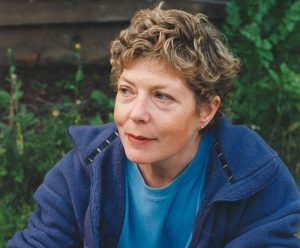
Joan Skogan was a one of a kind author deeply connected to the west coast.
An intrepid researcher and a conscientious writer, she will be much missed by those who knew her fascinating, passionate nature.
Joan Skogan was never able to recover from the disappearance of her 31-year-old son Joe Skogan who was reported missing in May of 2004. Joe was the product of her marriage to Ole Skogan, a fisherman. Almost three years later, on April 9, 2007, Quadra Island RCMP responded to the discovery of human remains in a wooded area off of Cutter Road. A forensic autopsy confirmed these were his remains. Foul play was ruled out; hence suicide was presumed.
The Campbell River Mirror recorded that he had attended a party on May 1, 2004 at which he was involved in a fight with another man over a woman. He left the party but later returned. He took a taxi from the Heriot Bay store to his rental home at 6 a.m. “The cabbie dropped him on Cutter Road where he got out and began walking. According to his friend Shane Hedefine, a handgun and bullets was missing from Skogan’s home. The two men were life-long friends and often played music together. Following Skogan’s disappearance, the area where he was last seen was extensively searched by authorities and friends. Hedefine went out several times to look for his buddy and passed close by to where he was eventually found.”
Joan Skogan took some of his possessions out into her garden to weather, including a cradle, and she planted native plants for him. She did not write another book. She said she could no longer write due to the lingering effects of a brain aneurysm she had suffered in her 40s, but her final book Mary of Canada was completed after that aneurysm.
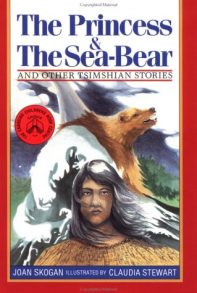 Joan Skogan’s first book was a collection of nine legends of animals and mythical creatures from the Prince Rupert and Metlakatla area, The Princess and the Sea-Bear and other Tsimshian Stories (Metlakatla Band Council, 1982). She would write several books for young readers during her career.
Joan Skogan’s first book was a collection of nine legends of animals and mythical creatures from the Prince Rupert and Metlakatla area, The Princess and the Sea-Bear and other Tsimshian Stories (Metlakatla Band Council, 1982). She would write several books for young readers during her career.
Joan Skogan would follow her 1983 history of the Skeena River fishery for B.C. Packers, Skeena: A River Remembered, with a memoir of working on foreign ships as a Canadian fisheries observer, during which time she lived aboard ships called Antares, Provideniia, Delfin beyond the 200-mile limit.
She was also mostly unable to communicate with crewmembers who spoke Russian or Polish. This brave book, Voyages at Sea With Strangers, was her attempt to make the leap into the bigtime, released by HarperCollins in Toronto in 1992. As a book that touched upon sexual politics at sea, it was arguably ahead of its time.
 The sea, as she well knew, was often a tumultuous place, and she was no stranger to tumult. In March of 1989, when the Exxon Valdez ran aground, resulting in an unprecedented oil spill, Joan Skogan had been on a ship in the area and heard the radio call to the coast guard. Thereafter she could and would recite the distress message she heard word-for-word. During the environmental disaster, she had helped with the clean-up of marine life and was greatly disturbed by the catastrophe. As a coastal writer she would consistently write about the ocean [see bibliography below] and she could be fierce in her opinions, particularly regarding the environment. Rogue waves did not exist. Whale watching did not bear discussion.
The sea, as she well knew, was often a tumultuous place, and she was no stranger to tumult. In March of 1989, when the Exxon Valdez ran aground, resulting in an unprecedented oil spill, Joan Skogan had been on a ship in the area and heard the radio call to the coast guard. Thereafter she could and would recite the distress message she heard word-for-word. During the environmental disaster, she had helped with the clean-up of marine life and was greatly disturbed by the catastrophe. As a coastal writer she would consistently write about the ocean [see bibliography below] and she could be fierce in her opinions, particularly regarding the environment. Rogue waves did not exist. Whale watching did not bear discussion.
Joan Skogan’s Moving Water again drew upon her own years at sea to tell the story of Rose Bachmann, a woman awash in the nets of transient fishermen, a woman at mid-tide in a life that is awash with the debris of a mysterious union, as well as myths both long known and newly invented, in the spirit of the petroglyphs. The story evolves from rebellious youth to a wordless marriage; then she meets Russian, Polish and Canadian fishing and cargo ship crews. Rose finds herself at rest in the rock form of a petroglyph entitled ‘The One Who Fell From Heaven, near Prince Rupert, B.C. and there she imagines, in a brilliant song to her past and those she has loved, voyages both real and surreal.
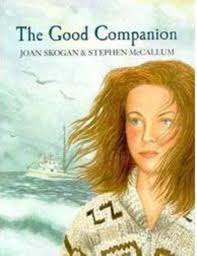 In Joan Skogan’s The Good Companion, superstition rules the sea. No whistling to call up the winds. No black suitcases to bring death on board. No cans opened upside down for fear of overturning the boat. The captain holds fast to the old ways. The crew’s coffee cups, hung in a row above the sink, always face inboard. First night out, dinner is always the same: ham, scalloped potatoes, raisin pie from the bakery in town. A girl with long red hair comes alongside in a half-swamped skiff, asking to come aboard. The captain is forced to keep the girl on board when the weather turns foul. “We’ll haul nothing but water now,” he warns. But the nets are full of fish day after day. When the red-haired girl bakes a chocolate cake, the captain refuses to eat any. “More for us,” says the engineer. She sits on the outside bench, where no one ever sat, peeling potatoes for the cook. “No women on boats,” the captain complains. At the first opportunity, he returns to port and drops her off. A gale turns into a ferocious winter storm. The dark sea pours over the wheelhouse windows. The boat takes on water. The men wait to go down. In a final desperate attempt to save the ship the captain calls on the power of the red-headed girl, and sees a vision that challenges his every belief.
In Joan Skogan’s The Good Companion, superstition rules the sea. No whistling to call up the winds. No black suitcases to bring death on board. No cans opened upside down for fear of overturning the boat. The captain holds fast to the old ways. The crew’s coffee cups, hung in a row above the sink, always face inboard. First night out, dinner is always the same: ham, scalloped potatoes, raisin pie from the bakery in town. A girl with long red hair comes alongside in a half-swamped skiff, asking to come aboard. The captain is forced to keep the girl on board when the weather turns foul. “We’ll haul nothing but water now,” he warns. But the nets are full of fish day after day. When the red-haired girl bakes a chocolate cake, the captain refuses to eat any. “More for us,” says the engineer. She sits on the outside bench, where no one ever sat, peeling potatoes for the cook. “No women on boats,” the captain complains. At the first opportunity, he returns to port and drops her off. A gale turns into a ferocious winter storm. The dark sea pours over the wheelhouse windows. The boat takes on water. The men wait to go down. In a final desperate attempt to save the ship the captain calls on the power of the red-headed girl, and sees a vision that challenges his every belief.
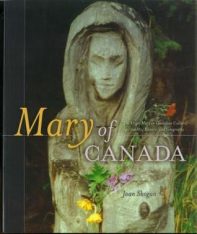 For her most wide-ranging book, Mary of Canada, Joan Skogan scoured Canadian towns and tomes for her non-religious celebration of the cult of Mary that is literally all over the map. “Mary lives in Canada. I know now,” she proclaimed. From obscure Virgin Mary references in a Lynn Coady novel to Leonard Cohen’s ribald re-creation of Blessed Kateri Takawitha, Lily of the Mohawk (1656-1680), in Beautiful Losers, to a Dashboard Mary on Canadian blues CD, Skogan repeatedly revealed how and where the appeal of the Virgin Mary in Canada is consistent with her followings in more Catholic countries such as Mexico and France. From tacky statuettes to the rock band called Our Lady Peace, Skogan revealed and reflected the ancient, worldwide appeal of Mary beyond the confines of Christian theology.
For her most wide-ranging book, Mary of Canada, Joan Skogan scoured Canadian towns and tomes for her non-religious celebration of the cult of Mary that is literally all over the map. “Mary lives in Canada. I know now,” she proclaimed. From obscure Virgin Mary references in a Lynn Coady novel to Leonard Cohen’s ribald re-creation of Blessed Kateri Takawitha, Lily of the Mohawk (1656-1680), in Beautiful Losers, to a Dashboard Mary on Canadian blues CD, Skogan repeatedly revealed how and where the appeal of the Virgin Mary in Canada is consistent with her followings in more Catholic countries such as Mexico and France. From tacky statuettes to the rock band called Our Lady Peace, Skogan revealed and reflected the ancient, worldwide appeal of Mary beyond the confines of Christian theology.
Skogan had a Masters in Fine Arts from the University of British Columbia and worked in both fiction and art journalism programs at Banff and Sage Hill. She taught adults in various schools and worked for many years in the commercial fishing industry. Her work appeared in Saturday Night, Georgia Straight, Border Crossings, Brick and Western Living and was read on several CBC radio programs. Her fiction appeared in the 1998 Journey Prize Anthology; Winds Through Time: An Anthology of Canadian Historical Young Adult Fiction (1998); Canadian Children’s Annual; Share a Tale; The Forest West of Our House: The Clayoquot Sound Anthology and others.
Joan Skogan was shortlisted for the Journey Prize, the CBC Literary Essay Competition and the Western Magazine Awards but she was not someone who hobnobbed in literary circles. More akin to a lone wolf, she lived in eastern Europe, including Bosnia, and chiefly resided in Prince Rupert, Gabriola Island and Nanaimo.
Her friend Barbara Ebbeson, who knew her during the last twenty years of her life, reports she had been in failing health for some years. “If I would describe Joan it would be as an author, and a poet, and fierce and loyal friend who was soft-spoken and ladylike. An elfin beauty. And she was a wild woman. Known to dance on table tops in bars. Sleep rough in a ditch in Bosnia. She corrected people for calling river otters sea otters. She would not suffer fools, not ever. She loathed cute signs on boats or houses. She liked to sing the song ‘Barnacle Bill’ with me but was very disapproving when I named my pink skiff ‘Barnacle Belle.'”
Journalist Margaret Horsfield was her friend for thirty years, having met while they were both swimming in the waters off Protection Island. “She brooked no opposition, from friends, editors, or fellow-writers, scorning shoddy thinking, poorly researched history or badly expressed opinions…” Horsfield recalls. “Joan’s rapier-like comments enlivened our long swim. As I came to know her, I learned quickly that she never failed to see through artifice.”
Afflicted with rheumatoid arthritis, in constant pain, she had to give away her beautiful gloves and shoes because they couldn’t fit anymore. She became very isolated and often angry. Her neighbours all liked her and looked in on her. “I don’t think she let herself be angry with them,” one of them said, “but sometimes anger is reserved for those we love the most.”
During her final years, Joan Skogan did things in 20-minute increments… she would sew… she would stain the walls of her house in various shades of yellow… she would make curtains out of things like yellow wool blankets. Art was everywhere. She frequented thrift stores, giving bags and bags of gifts to her friends. Books. Books. And more books. As well as scarves, jackets, cowboy boots. The constants in her house were her sculptures and First Nations baskets. She ordered and re-organized her belonging rigorously, but in 20-minute sessions. Everything was neat like the inside of a boat.
On her Gabriola Island property, after the tragic loss of her son, she had remained creative with her strange and wonderful garden. She planted trees everywhere–alders, cedars, firs and a gigantic sequoia — planting on the road allowance. She stained her garden gate a luscious shade of turquoise and enjoyed sending postcards with odd messages. One provided instructions for fixing a recalcitrant sewing machine. After leaving Gabriola, before she moved to Nanaimo, Joan Skogan briefly lived in Vancouver. Few people had impartial relations with her, and she had her share of lovers. She was not someone who stayed on the sidelines.
“The most important thing about Joan,” wrote mezzo-soprano Barbara Ebbeson, “was that she had a radiant obsession with Canada. She loved this country, every inch of it. She loved the songs, the poems, the literature, the trees, the plants, the fish, the animals, the geography, the mountains, the rivers, the everything… she made it her business to know all about it and she was proud about it -all and every part of it.”
Joan Skogan died on July 29 at her home in Nanaimo. Her ashes were spread on the Skeena River.
AWARDS:
Wallace Stegner Non-Fiction
Shortlisted, Journey Prize, 1993.
Long Grain of Truth Prize, Grain magazine, 2003
Western Magazine awards.
CBC Literary Award, Essay category.
BOOKS:
 Skogan, Joan. Mary of Canada The Virgin Mary in Canadian Culture, Spirituality, History, and Geography (Banff Centre Press, 2003)
Skogan, Joan. Mary of Canada The Virgin Mary in Canadian Culture, Spirituality, History, and Geography (Banff Centre Press, 2003)
Skogan, Joan. Moving Water (Beach Holme, 1998)
Skogan, Joan. The Good Companion (Orca Books, 1998)
Skogan, Joan. Voyages at Sea With Strangers (HarperCollins, 1992)
Skogan, Joan. Grey Cat at Sea (Polestar, 1991)
Skogan, Joan. Claudia Stewart (Polestar, 1990)
Skogan, Joan. Skeena: A River Remembered (B.C. Packers Ltd., 1983)
Skogan, Joan. The Princess and the Sea-Bear and other Tsimshian Stories (Metlakatla Band Council, 1982; Polestar, 1990)
by Alan Twigg

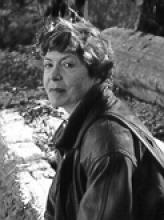

Joan signed our copies of “Grey Cat at Sea” and “The Good Companion” at the Prince Rupert Public Library. Those books have lived with us all these years. Neither book is “just a child’s book”. After I heard about Joan I reread “The Good Companion”. I had forgotten how profound and thought provoking a story it is.
Always thought of fondly, miss our chats and the precious hours we spent together, roaming, shopping, and reminiscing, especially the many stories, often sharing tears of our lost loved ones. You taught me so much, your interests, passions and knowledge were boundless. Fitu XOXO
RIP Joan Will always remember you fondly ❤️
An inspiring spirit, a significant loss.
Farewell old friend. You did have a fantastic sense of humour in the old days. We also missed our Joe. Funny, I was just thinking about him today. Joe was a lifetime friend to my son Shane. They met when they were 3 years old.
You were a brave adventurer Joan Skogan. You leave a lasting legacy with your many books. Rest in peace now.
Calm water and fair winds, Joan.
“Ya did good, woman.”.
Oh Joan, you were fierce and generous and a wonderful writer. Moving Water is one of the great ones. You were too.